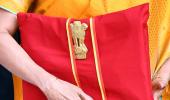The hearing on Nirav Modi’s appeal against extradition to India concluded with a timetable to wrap up the appeal in the New Year, as Nirav's defence team were granted time until Monday to submit their queries on India's assurance from last month.
The high court in London on Tuesday heard Nirav Modi's appeal on the grounds of his mental health against extradition to India to face charges of fraud and money laundering, amounting to an estimated $2 billion in the Punjab National Bank (PNB) loan scam case.
Lord Justice Jeremy Stuart-Smith and Justice Robert Jay presided over the hearing at the Royal Courts of Justice to determine whether District Judge Sam Goozee's February ruling in favour of extradition was incorrect to overlook the diamond merchant's “high risk of suicide”.
The court heard of an additional assurance from the Indian authorities on November 13, which reiterates previous commitments of adequate specialist medical care and an ambulance at hand were Nirav to be extradited to Mumbai.
The Indian authorities will then have until December 23 to respond, with a January 4, 2022, deadline set for the defence team to revert, following which a hearing date will be agreed to progress towards a ruling on the appeal.
“He is at high risk of suicide already and his condition is likely to deteriorate further in Mumbai,” Edward Fitzgerald QC argued as he opened the appeal on behalf of Nirav Modi – who remains behind bars at Wandsworth Prison in south-west London since his arrest in March 2019.
Fitzgerald went on to lay out before the two-judge bench that the Indian government assurances of medical assistance at Barrack 12 of Mumbai Central Prison on Arthur Road, where the accused is to be held on being extradition, would not be adequate given the “certainty” of deterioration in his mental health.
He also sought an adjournment in view of the short time-frame to study the new assurance from India, received last month.
The judges referred to the case of Wikileaks founder Julian Assange, who recently lost his extradition appeal against the US government, with reference to India's “sovereign assurances” falling within a similar vein.
The hearing on Tuesday follows a ruling in August from high court Justice Martin Chamberlain that arguments concerning the 50-year-old's “severe depression” and “high risk of suicide” were arguable at a full appeal hearing.
A group of Enforcement Directorate (ED) and Central Bureau of Investigation (CBI) officials had flown in from India for the case, which was presented in court by the UK's Crown Prosecution Service (CPS) barrister Helen Malcolm QC on behalf of the Indian authorities.
The appeal against Judge Goozee's Westminster Magistrates' Court ruling to send the case to the Home Secretary was granted leave to appeal in the high court on two grounds – under Article 3 of the European Convention of Human Rights (ECHR) to hear arguments if it would “unjust or oppressive” to extradite Nirav due to his mental state and Section 91 of the Extradition Act 2003, also related to mental ill health.
Nirav's “high risk of suicide” and the “adequacy of any measures capable of preventing successful suicide attempts in Arthur Road prison” were deemed as the focal points for the appeal.
Nirav's legal team have sought to establish that it would be oppressive to extradite him due to his mental condition that could lead to suicidal impulses, given the family history of suicide of his mother, and that he is at risk of “flagrant denial of justice” in India.
The lawyers have also claimed the COVID-19 pandemic is “overwhelming” the Indian prison system.
The CPS, on behalf of India, has highlighted the “high level of diplomatic assurance” to provide adequate medical attention to the accused on being extradited to face trial in India.
At a remote “renewal application” hearing in August, the permission to appeal was denied on all other grounds, including the admissibility of evidence provided by the ED and CBI and against UK Home Secretary Priti Patel's extradition order.
The high court also noted that the District Judge's approach to the identification of a prima facie case in the PNB fraud case was “correct”.
Nirav is the subject of two sets of criminal proceedings, with the CBI case relating to a large-scale fraud upon PNB through the fraudulent obtaining of letters of undertaking (LoUs) or loan agreements, and the ED case relating to the laundering of the proceeds of that fraud.
He also faces two additional charges of "causing the disappearance of evidence" and intimidating witnesses or “criminal intimidation to cause death”, which were added to the CBI case.
If Nirav wins this appeal hearing in the high court, he cannot be extradited unless the Indian government is successful in getting permission to appeal at the Supreme Court on a point of law of public importance.
On the flip side, if he loses this appeal hearing, Nirav can approach the Supreme Court on a point of law of public importance, to be applied for to the Supreme Court against the high court's decision within 14 days of a high court verdict.
However, this involves a high threshold as appeals to the Supreme Court can only be made if the high court has certified that the case involves a point of law of general public importance.
Finally, after all avenues in the UK courts are exhausted, the diamantaire could still seek a so-called Rule 39 injunction from the European Court of Human Rights.











 © 2025
© 2025